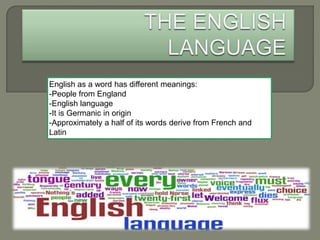
The English Language
- 1. English as a word has different meanings: -People from England -English language -It is Germanic in origin -Approximately a half of its words derive from French and Latin
- 2. •Irish and Scottish English are varieties of English influenced by the Celtic languages.
- 3. Roman Empire ruled much of Europe until 476.
- 4. LATIN Influence on ENGLISH and GERMANIC. Words as: -wall Were borrowed from Latin -kitchen into Germanic (and through -wine Germanic into English) -mil -street Its influence continues through Medieval and Renaissance times, through the catholic church, Humanism and Renaissance. English starts when the Germanic tribes and their languages reach the British Isles (449)
- 6. The word ENGLISH derives from the Angles.
- 7. Started as a Germanic dialect spoken in small part of England, nowadays it is spoken by over a billion people all over the world. -English has adopted -approximately a half of the words from other vocabulary of English comes from languages French and Latin
- 8. Differences on three levels: Caedmon’s Hymn: Sounds Words Sentences -Hefaen Heaven (no leter “v”) -English has 25 consonants, other -uard guard (“u” is pronounced differently) languages have -Lack of grammatical words as of, the, and we different quantities. -OE sentence (1) contains less words than the -The most unusual modern one (this additional words have a consonant is the “th” grammatical function) (It represents 2 different sounds) -There are many differences!
- 9. English syllable -One of the functions of the language is to structure is indicate who does what to whom COMPLEX Languages differ in how they mark these There are words as: functions through: a) Endings on the verbs and nouns Strikes and split b) Word order and grammatical words (prepositions and pronouns) 3 consonants at the c) Old English- synthetic/Modern E.Analytic beginning Have almost no endings they -In Spanish we adapt use word order and grammatical words to mark the the sound “sk” to element’s function “esk” as in School to -Whereas many languages of the Americas have: ESchool Prefixes on the verb and the verb can represent an entire sentence Navajo nanishté has 3 prefixes and a stem (na-ni-she-té) “arround yo I carried”
- 10. VARIETIES They are different, even though they are English in their grammars External changes: Internal changes: -Language contact (between -occur when speakers stop using endings speakers of different languages) (or inflections) and start to rely on words such as of, for, the and have. -Innovations by speakers -more predictable -issues of political or social -Change a vowel or a consonant: identity Old English hamhome -Unpredictable skip ship -have to do with social, -prepositions start being used to introduce economic, geographical, political, sentences. and historical reasons.
- 11. Prescriptive rules: -Are taught in school -include “don’t split infinitives” and “don’t end sentences with a preposition”. -Are based on Latin, on logic, or on an attempt to conserve an older stage of the language. -Internal changes can be markers of identity. e.g.: “eh” as a marker of identity in Canada.
- 12. OLD ENGLISH (OE) 450 - 1150 H 8th and 10the century the Scandinavians J influenced on the Latin words: grammar. Year 450, Germanic •Abbot Some words such as: -egg, keel, leg, ill, add, dialects pushed out •Altar bask, call, crave, screech and thrive Celtic Languages to the periphery, e.g. Wales •hymn